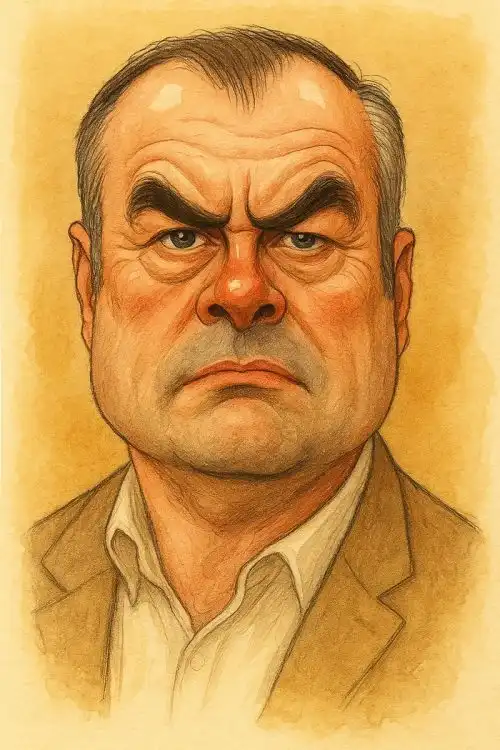Chris Ellison: The Tough Presence Behind DI Frank Burnside in The Bill
Early Life & Training
Born June 16, 1946, in London, Christopher Michael Ellison grew up in South London’s working-class neighborhoods. He held various jobs, including building sites and insurance clerking. As a result, he developed a grounded realism that later shaped his screen personas. Then he pursued drama training at the prestigious Drama Studio London, where he refined his charisma and honed his stage technique. Consequently, he was well-prepared for television roles that demanded authenticity and grit.
Breakthrough & Defining Role: DI Frank Burnside in *The Bill*
Ellison’s defining breakthrough came in 1984 when he was cast as Detective Sergeant Frank Burnside in ITV’s iconic police drama, *The Bill*. Originally intended as a short-term minor character, Burnside struck a chord with audiences. As a result, he was promoted to Detective Inspector and rapidly became a central figure in the series.
Set in the fictional Sun Hill station, *The Bill* provided a realistic look at policing in London. Moreover, it focused on moral dilemmas and personal conflicts faced by officers. Ellison’s portrayal of DI Burnside brought intense energy, street smarts, and moral complexity to the role. His Burnside was tough, occasionally ruthless, but always effective. Additionally, Ellison infused him with charisma and depth that made Burnside one of the series’ most memorable characters.
Acting Style & Range
Ellison’s acting style emphasises raw energy, commanding presence, and streetwise authenticity. His Burnside benefitted from subtle expressions and controlled intensity. As a result, the character felt real rather than theatrical. Beyond *The Bill*, Ellison showed versatility. He appeared in crime films, took the stage, and even embraced light-hearted roles. Nevertheless, he always brought grounded realism and commitment to character-driven performances.
Notable Performances Beyond *The Bill*
- *Burnside* (2000) – He reprised Frank Burnside in this gritty standalone spin-off. It offered deeper insight into the character’s methods and motivations.
- *The Great Train Robbery* (2013) – Ellison joined the ensemble cast in this BBC dramatization of the famous 1963 heist.
- *EastEnders* – As a guest star, he reaffirmed his connection to Britain’s major television institutions.
- *New Tricks* – His appearance in this crime-comedy drama showcased his ongoing relevance in the genre.
Awards & Recognition
Although Ellison hasn’t received major international awards, his cultural impact is undeniable. His long-standing role in *The Bill* earned him widespread recognition within British television. Moreover, his contribution to ITV’s programming over several decades remains influential among fans and peers.
Collaborations & Industry Impact
Ellison’s work on *The Bill* involved rich collaboration with cast, writers, and producers. His chemistry with co-stars like Eric Richard and Trudie Goodwin added authenticity to the series. Furthermore, his persona added gritty unpredictability to the procedural format. Consequently, the program evolved from standalone episodes to emotionally complex storytelling. Ellison’s Burnside helped redefine the boundaries of television policing.
Cultural Legacy
Chris Ellison’s DI Frank Burnside left an indelible mark on British pop culture. His character reflected uncompromising authority, moral tension, and street-level realism. As a result, Burnside became a template for tough detectives on TV. Moreover, his signature trench coat and steely gaze remain iconic. Even after his final appearance, he remains strongly associated with *The Bill* and the golden age of British crime drama.
Behind-the-Scenes
Off-screen, Ellison is known for his dry wit and down-to-earth demeanor. Despite playing hardened detectives, he is approachable and generous with fans. Later in life, he faced a stroke in 2020 and openly shared his recovery process. His transparency earned him further admiration for resilience and courage beyond his acting career.
Final Word
Chris Ellison’s portrayal of DI Frank Burnside stands as one of British television’s most enduring detective roles. With grit, authenticity, and powerful presence, he helped shape the tone of hard-hitting police dramas. His legacy continues to influence modern TV. Above all, Ellison reminds us that a great detective is authentic, complex, and unforgettable.
FAQ – Chris Ellison
- What is Chris Ellison best known for? Portraying DI Frank Burnside in *The Bill*.
- Did he continue his role after *The Bill*? Yes—he reprised Burnside in the spin-off *Burnside* (2000).
- Has he worked in other TV dramas? Yes—he appeared in *EastEnders*, *New Tricks*, and *The Great Train Robbery*.
- Has he received major awards? Not internationally, but he is widely respected in British TV.
- Is he still active in TV? Post-stroke, he remains connected to fans and continues recovery with grace.
